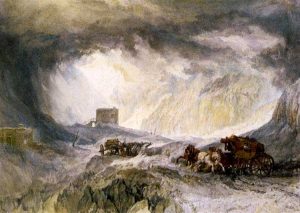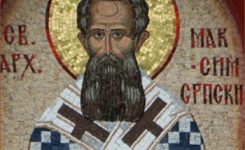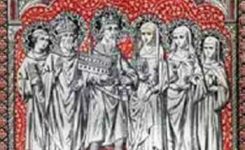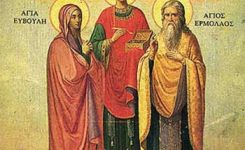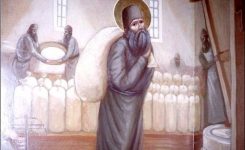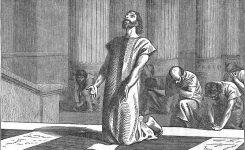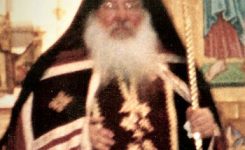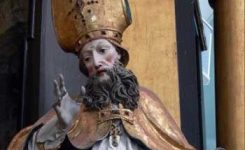prayer liturgical
Saint Heldrad of Novalèse
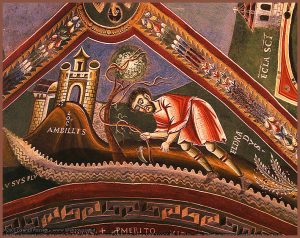
Saint Heldrad, abbot. Medieval fresco in Eldrad’s chapel at Novalese Abbey Photo courtesy of Duvilar (Lorenzo Rossetti) (IT)
Saint Heldrad of Novalèse (c. 875)
Feast Day: March 13/26
Heldrad (Heldradus, Eldradus, Eldrad) was born in 781 into the wealthy family of Ardrad, the first Lord Lambesc, at Lambesc in Provence, a town at the foot of the Côtes Mountains in the south of France. Provence was then a part of the Carolingian kingdom, which was expanding towards Italy. It was in 814 while on a pilgrimage by boat, in Italy, that he “…discovered the Monastery of Novalèse in Piémont: at the passage of Mont-Cenis was a home of charity and of Christian perfection.” The Monastery had been founded in 726 above a pre-existing church. The new Monastery was dedicated to Saint Peter and Saint Andrew, and adopted the Benedictine rule in 817. Thus, he “…left the joyous warmth of Provence for the rude climate of Mont-Cenis, in order to find in solitude the presence of the Lord.”
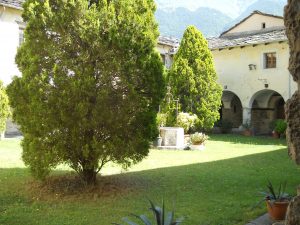
Cloister of the Abbey
Photo courtesy of Duvilar (Lorenzo Rossetti) (IT)
Dressed in poor pilgrim’s clothes, He presented himself to the monastery of Novalèse. The Hegumen Amblulfe, himself a Provençal, recognized his compatriot the lord of Lambesc beneath this humble clothing, and “…after several days of conversation, he was persuaded of his authentic vocation” and received him as a novice. He was given the obedience of tending the vineyards of the abbey and after exhibiting “…charity, patience, meekness and instructed by the teachings of Saints Benedict, Basil and Colomban…” he was clothed with the schema. Because of his great virtue, Amblulfe then “…had him ordained to the priesthood, then he confided him with the care of the travelers and the formation of the young recruits.”
In the time of Heldrad, his Abbey kept the Hospice of Mount Cenis, located at a mountain pass which connected France and Italy, making it of capital importance for Franco-Italian relations of the epoch. Charlemagne was himself harbored there, without doubt in the summer (in winter, he passed rather by Nice and dwelt in the abbey of Saint Pons).
In the canon we learn “Difficult service was the exercising day and night charitable hospitality towards travellers in transit from one country to another by steep roads, amidst so many perils.”
Heldrad was elected hegumen of Novalèse in 844 and he founded a new hospice-priory at Pagno, near the pass of Lautaret, in Dauphiné (this may have also been a restoration of an earlier monastic dwelling founded by disciples of Saint Colombano [Bobbio Abbey], 7th c.).
Further information we glean from the akolouthia of the Saint is that when Abbot Amblulfe reposed, Louis the Pious, co-emperor and son of Charlemagne, connived to set his brother in this position; “but when he died, the unanimity of voices fell on Heldrad as an obligation to accept a charge which challenged his humility.”
Among his exhortations to his monks, he said “We have nothing to expect in the other life, if not the just proportion of that which we shall do here below for our neighbor, in order to please God.” As abbot, he “…instituted continuous praise so that it might go hand in hand with hospitality day and night in that it was not only an inn, but a home where fervent charity radiated amidst the mountains.” In his charity to the poor, he significantly instructed them in religion.
His prayers healed mutes, the lame, lepers, and purified the consciences of sinners. He cleared snakes from the mountain pastures by ordering them to plunge into a hole out of which they never returned, for they feared him.
He died on 13 March, c. 875. Eldrad is the holy patron of Lambesc.
Troparion
1st tone
The desert was thy city, in the flesh thou wast an angel, thy charitable works have made thee famous, O God-bearing Father Heldrad; by fasting, vigils and continuous prayer thou didst receive gifts from heaven of driving out serpents and demons. Glory to Him who has given thee this power, glory to Him who has crowned thee, glory to Him who works salvation in all, by thy prayers.
Kontakion
6th tone (Plagal 2nd)
The kingdom of the heavens belonged to thee for having had the spirit of poverty and thanks to thy humble charity, O Heldrad, thou didst dwell in the land which the meek possessed; thou the merciful one, obtain from the Lord for us that He grant us mercy.
Verses:
Heldrad, by flying over our earthly ground, could pass without pain to the heavenly pass. On the thirteenth day (of March), Heldrad took his flight for heaven.
Prayer of Shepherds to Saint Heldrad
O blessed Heldrad, friend of the Lord, ask Him, on behalf of the poor shepherd, that His Providence may always produce the grass on the mountains, that it grant the increase of all that which is suitable for them, that it give to the beasts the food which is proper for them and take finally in its protection them that are meek, in particular the small shepherd wandering in the mountains.
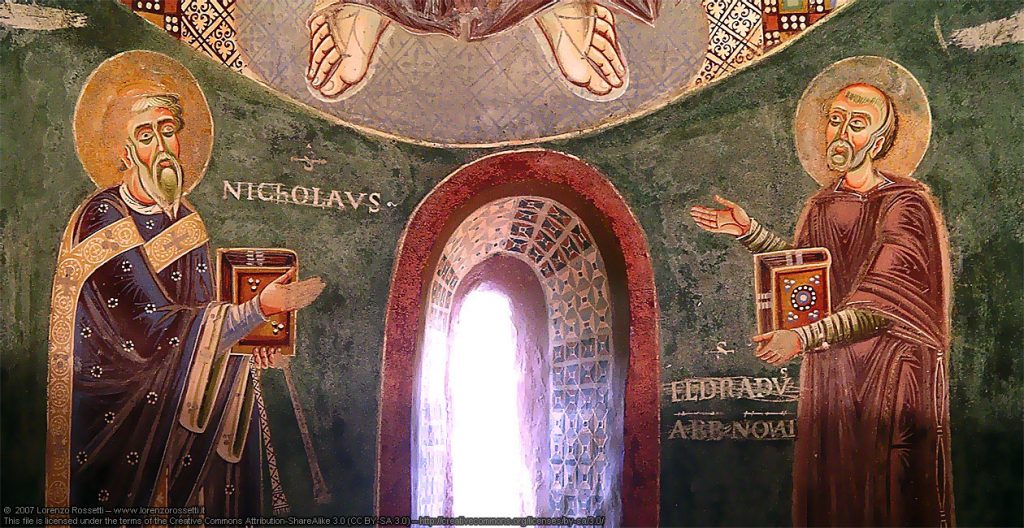
Late 11th century fresco of Saints Heldrad and Nicholas, one of the first frescoes of Saint Nicholas in continental Europe. Photo courtesy of Duvilar (Lorenzo Rossetti) (IT)
Translated by Schema-Archimandrite John (Lewis) +2007
From the French Akolouthia composed in 2001 by Hieromonk Denis (Guillaume) +2008, in Supplément au Ménée de MARS and published in Самиздат, September 2001, pages 155-160
Synaxaria augmented by Mother Andrea

